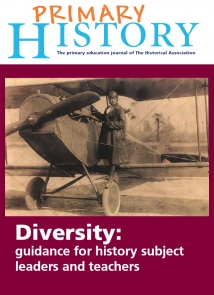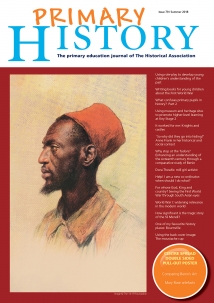Diversity in Primary History
Useful articles in 'Primary History'
|
Each section of this unit begins by highlighting articles based on the current National Curriculum, and is followed by earlier pieces that are still worth reading. Please note that while the core advice is still relevant, articles from editions published prior to Primary History 66 will be based on the old National Curriculum. |
NB for an even more comprehensive set of Diversity articles and resources divided into 13 sub-categories see Diversity in Primary History.
1. Managing/organising diversity in the curriculum
2. Managing and organising sensitive and controversial issues in the curriculum
3. Telling diverse histories
4. Addressing sensitive and controversial issues
1. Managing/organising diversity in the curriculum

- Primary History Summer Resource 2019. Focus on Diversity by Karin Doull and Paul Bracey - covering issues such as what is diversity? National identity, coverage, criteria, examples, transition to KS3. Separate sections on Key Stage 1 (examples such as shopping, hospitals, holidays, significant individuals, local history, suffragettes) and Key Stage 2 covering issues such as migration, trade, female power and achievement, black soldiers and local history). Extensive bibliography.
- ‘Diversity in Primary History’ (Centre spread) PH 88, summer 2021
- Alison Gove Humphries, Paul Bracey and Darius Jackson, ‘Why is diversity so important? How can we approach it?’ PH 75, spring 2017.
Also:
- Ilona Aronovsky, ‘History belongs to us all: Diversity and the History Curriculum’ PH 65, autumn 2013. Detailed and useful analysis with many examples.
- Tim Lomas, ‘Inclusion, diversity and the national curriculum: are things better than they were?’ PH 65, autumn 2013.
- Gulcin Dilek, ‘Constructing women’s past and gender perspectives in history teaching through creative activities’ PH 63, spring 2013. Pupils acting as journalists
- Sarah Whitehouse and Mark Jones, ‘Creative exploration of local, national and global links’ PH 63, spring 2013. Using two contrasting Bristol schools
- Kay Traille, ‘Whose History is it anyway? Class, Culture, Ethnicity, Gender, Religion’ PH 57, spring 2011.
- Alison Gove-Humphries, Paul Bracey and Darius Jackson, ‘Dimensions of Britishness: Cultural Diversity and Ethnicity’ PH 57, spring 2011
- Kay Traille, ‘Primary History and the Curriculum: the perspective of students of African-Caribbean origin and their mothers’, PH 50, autumn 2008
- Lance Lewis and Helen Coxall, ‘Ways of Making Key Stage 2 History Culturally Inclusive: A Study of Practice developed in Kirklees’, PH, 29, October 2001.
- Hilary Claire, ‘Planning for Diversity in the Key Stage 2 History Curriculum’, PH 28, May 2001. Although designed for an earlier version of the curriculum contains useful ideas.
2. Managing/organising Sensitive and Controversial issues in the curriculum
Also:
- James Hennessey, ‘Engaging with controversial issues through drama’, PH 46, summer 2007.
- Hilary Claire, ‘History, Citizenship and Controversy’, PH 46, summer 2007.
- Helena Gillespie, ‘Teaching Controversial Issues 8-11’ in PH 46, summer 2007. Based on HA TEACH report.
- Dean Smart, ‘Citizenship, Controversial Issues and Identity in the Transition Year’, in PH 46, summer 2007
3. Telling Diverse histories

- Andrew Wrenn, ‘Nothing was easy: viewing war, empire and racism through the eyes of a local Windrush migrant’, PH 100, summer 2025
- Bev Forrest and Mel Jones, Disability in primary history teaching: seeing the specific threads in the tapestry, PH 98, autumn 2024
- Stuart Boydell, ‘Significant anniversaries: The Bristol Bus Boycott, 1963’, PH 95, autumn 2023
- Kate Loveman and James Harrod, ‘Exploring the Great Fire of London and Deaf history’, PH 95, autumn 2023
- Bee Rowlatt and Kirsty Ruthven, ‘Significant people: Why it's worth considering Mary Wollstonecraft’, PH 94, summer 2023
- Helen Crawford, ‘Significant anniversaries: Windrush 75: How can we teach this valuable topic?’ PH 94, summer 2023
- Steven Kenyon, ‘Teaching black British history through local archives’, PH 94, summer 2023
- Andrew Wrenn, ‘Teaching the British Empire in primary history: very important but tricky!’ PH 92
- Ailsa Fidler, ‘Wangari Maathai as a significant individual: positive representation within a broad and balanced curriculum’ PH 91, summer 2022.
- Damienne Clarke, ‘Significant anniversaries in 2022: 50th anniversary of the UK’s first official Pride march: 1 July 2022’, PH 90, spring 2022.
- Matt Flynn, ‘Promoting Gypsy, Roma and Traveller Heritage in your primary curriculum’, PH 89, autumn 2021.
- Matthew Sossick, ‘Significant Individuals: Arthur Wharton: The world’s first professional black footballer’, PH 88, summer 2021
- Karin Doull, ‘Exploring the spices of the east: how curry got to our table’, PH 87, Spring 2021
- Paul Bracey, ‘George Floyd protest in Bristol: Colston statue toppled (History in the News)" PH 86, Autumn 2020
- Paul Bracey and Darius Jackson, ‘Migration to Britain through time’ PH 85, Summer 2020 (plus Pull-out Poster: Migration to Britain; see also Scheme of work: journeys - the story of migration to Britain)
- Stuart Tiffany, ‘LGBT History Month’ Ideas for Assembly PH 81, spring 2019
- Alf Wilkinson, ‘Women in Parliament since 1918: 100 years of suffrage’ PH 80, autumn 2018
- Hayyan Bhabba, ‘World War I: widening relevance in the modern world’ PH 79, summer 2018
- Karin Doull, ‘Dora Thewlis: Mill girl activist’ PH 79, summer 2018.
- Andrew Wrenn, ‘For whose God, King and country? Seeing the First World War through South Asian eyes’ PH 79, summer 2018.
Also:
- Dr Matthew L N Wilkinson, ‘Including the Muslim Contribution in the National Curriculum for History’ PH 65, autumn 2013
- Thomas Briggs, ‘The man who helped win the war, invented computing and inspired artificial intelligence research’ PH 65, autumn 2013. Alan Turing
- Alison Mott, ‘Diversity, ethnicity and the Victorians’ PH 65, autumn 2013
- Nina Sprigge and Kirsty Sullivan, ‘Teaching diversity through drama at the Museum of London: Stories of London people’ PH 65, autumn 2013.
- Dianne Excell, ‘History through connecting classrooms in Bradford and Peschawar, Pakistan’ PH 65, autumn 2013
- Bev Forrest, ‘Towards inclusion: a study of significant figures and disability within the national curriculum’ PH 65, autumn 2013
- Jackie Ould-Okojie, ‘Exploring our roots: oral history and the local community’, PH 46, summer 2007. Experiences of migrants aimed at Y5-Y9
- Hilary Claire, ‘How should we remember Rosa Parkes?’ PH 43, spring 2006
- Katherine Hann, ‘Migration: the search for a better life?’ (In my View), PH 37, summer 2004.
- Paul Bracey, ‘Enjoying a Good Story’ (In My View) in PH 34, spring 2003. The Ireland in Schools Project
- Hilary Claire, ‘Britain and the Wider World in Tudor Times’, PH 29, October 2001. Although designed for a previous curriculum, many excellent ideas related to diversity
- Elizabeth Newman and Dick Turpin ‘Spicing up the National Curriculum’, PH 15, February 1997. Romans and Spice trade. A theme for an ethnically diverse school
4. Addressing Sensitive and Controversial issues
- Richard Harris, ‘Why are there so many mummies in Western museums?’ PH 95, autumn 2023
- Andrew Wrenn, ‘Teaching the British Empire in primary history: very important but tricky!’ PH 92
- Dan Lyndon-Cohen, ‘Exploring Empire, Artefacts and Local History’ PH 88, summer 2021
- Karen Van Coevorden, ‘Teaching about the Kindertransport without the Kinder’ PH 84, spring 2020
- Susie Townsend, ‘Teaching sensitive subjects: slavery and Britain’s role in the trade’ PH 83, autumn 2019
- Darius Jackson, ‘So why did they go into hiding? Anne Frank in her historical and social context’ PH 79 summer 2018
- Martin Winstone, ‘Is there a place for the Holocaust in the primary curriculum?’ PH 77, autumn 2017. Includes co-ordinator notes.
Also:
- Jane Card, ‘Slavery in Britain and the portrait of Dido Belle and Lady Elizabeth Murray’ PH 65, autumn 2013.
- Carole Turner, ‘The journey: World War II evacuees and Kindertransport – working with the Holocaust Centre’ PH 65, autumn 2013
- Kamai Bhana, ‘Is teaching about the Holocaust suitable for primary aged children?’ PH 61, summer 2012
- Amy Robson and Kelly Hogg, ‘Racism and Equality through the 1936 Berlin Olympics: The Olympics, Nationalism and Identity’ PH 58, summer 2011
- Mike Mitchell, ‘History, Citizenship and National Identity: The Katyn Massacre’ in PH 57, spring 2011
- Anna Salaman, ‘Teaching about the Transatlantic Slave Trade and Emancipation’, PH 46, summer 2007
- David Rosenberg, ‘Teaching about racism, fairness and justice through key people’, PH 46, summer 2007
- Diane Rougie, ‘I could change the world if I put my mind to it! Teaching controversial issues and citizenship through a project on heroes and heroines’, PH 46, summer 2007
- Anita Parmar, ‘As a primary school teacher have you taught about the Holocaust?’, PH 42. Spring 2006

